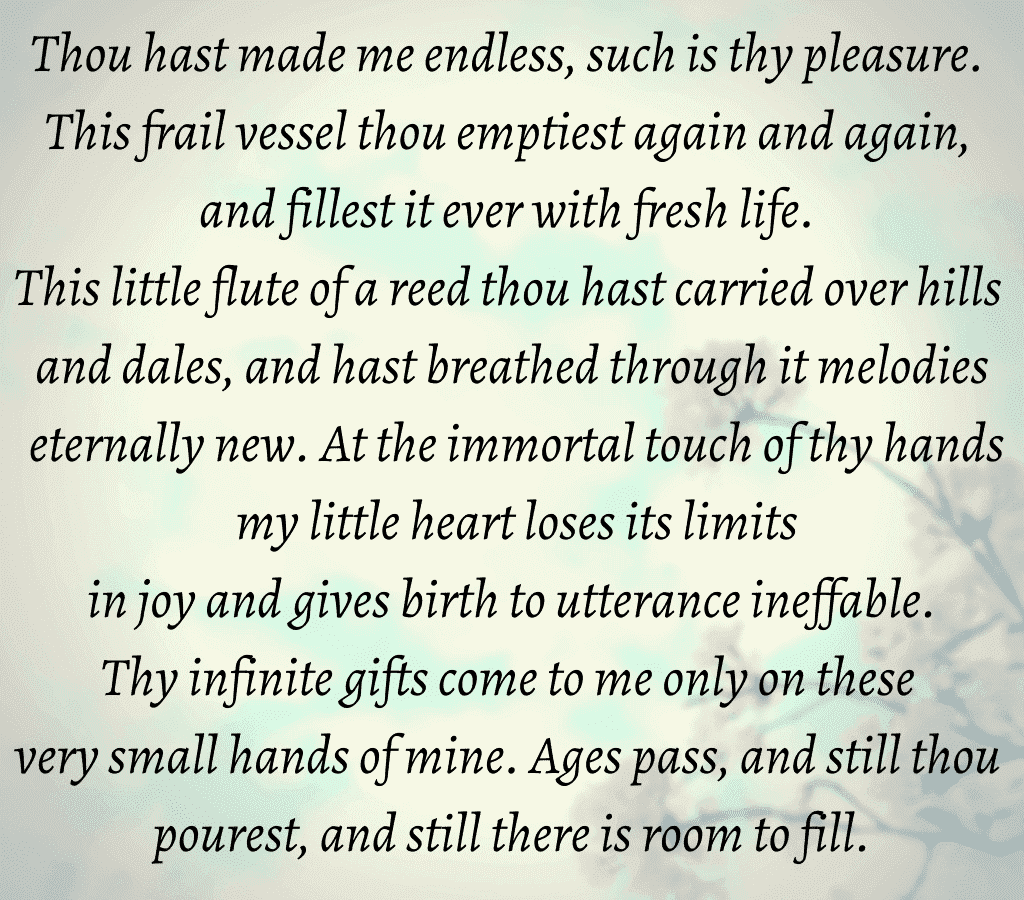
Thou hast made me endless, such is thy pleasure,
this frail vessel thou emptiest again and again,
and fillest it ever with fresh life.
This little flute of a reed thou hast carried over hills and dales,
and hast breathed through it melodies eternally new.
At the immortal touch of thy hands,
my little heart loses its limits in joy and gives birth to utterance ineffable.
thy infinite gifts come to me only on these very small hands of mine.
Ages pass, and still thou pourest, and still, there is room to fill.
It is the first poem from the collection of poems “Gitanjali” by Rabindranath Tagore.
Thou Hast Made Me Endless Summary
The poet begins his ‘song offering’ in a spirit of absolute humility. God has made the human soul never perish. It is God’s will that the human soul is eternal and immortal. The human body is like a frail vessel that God empties repeatedly and then fills it ever with fresh life. Man dies and takes birth in another shape. In this way, human life is constantly renewed. It shows Tagore’s faith in the Hindu doctrine of transmigration
The poet compares his body to a flute made of reeds. God is the musician and He plays upon it everywhere, over the hills, as well as, in valleys. He always plays new and fresh melodies. The poet means to say that it is under divine inspiration that he can always sing fresh and new songs. As God is everywhere and in every object of Nature, he gets His inspiration everywhere and sings over hills and dales. Whenever God touches his soul with His immortal hand, i. e. whenever He inspires him, he sings with immense joy, forgetting his own physical limitations. He loses his identity in his union with the Infinite. In this way, there takes place union of man and God; the eternal soul gets absorbed in Infinite.
God’s bounty knows no limit. His gifts are numerous, and He has scattered them everywhere for ages. But the human soul is too small to enjoy in total abundance and profusion of divine bliss. Again, the human soul is compared to a little child, whose hands are too small to hold the gifts his parents offer to him. God has been bestowing His gifts upon His slaves for ages, and still, His blessings are not exhausted. God’s gifts are endless, but man is not great and wise enough to make use of God’s gifts, which accounts for his poverty and wretchedness.
Critical Appreciation Of The Poem
Thou Hast Made Me Endless poem deals with the vastness and immensity of God’s love and His gifts and the intimate relationship of love existing between Him and the Poet. The Poet shows how kind and generous God is to humankind. He has created this universe and scattered His innumerable blessings and gifts through the universe for the advantage of man. God wishes man to realize His greatness, vastness, and generosity, so that Poet may aspire to strengthen the bond of relationship with Him. He must make efforts to seek a union with God. When a man devotes himself to his ‘Bhakti’ and tries to become one with Him, Poet becomes pleased with His devotee and bestows His peculiar gifts upon him. The devotee gets direct inspiration from Him, and he sings and hears and does only what God wishes him to sing, hear, see, and do. This is the climax of the devotee’s love that in all his actions, he is inspired by his Creator, i.e., the Supreme. Whether Tagore has attained this state or not is not certain. But throughout his poetry, he speaks of divine inspiration. Poet sings in praise of God because God inspires him to do so. When he gets this inspiration, he becomes oblivious of his physical limitations and feels such an immense joy that he cannot express in words.
In this poem, the Poet has used concrete images drawn from everyday experiences to communicate highly abstract concepts. Thus, the body is first compared to a weak or a ‘frail vessel’ and soul to the water. Filled in it. Next, God is presented as a flute player, and the human soul is compared to a flute of reed. In the Gitanjali, we may find this mingling of the concrete and the abstract from the beginning to the end. The epithets flute and ‘reed’ bring out the complete humility of the Poet. The Gitanjali is a humble offering of a song to the divine. The poem shows the Poet’s faith in the theory of reincarnation of souls after death: The frail vessel thou emptiest again and again.
The same idea is expressed in the Gita. As a man casting off worn-out garınents taketh the new ones, so the dweller in the body” casting off the worn-out body, enters into others, that are new.’ Or if thou thinkest as being constantly horn and constantly dying. Even then, O mighty-armed thou shouldst not grieve.
The imagery is reminiscent of Rumi’s “Song of the Reedflute”!
I’m surprised that Tagore never acknowledged this borrowing!!